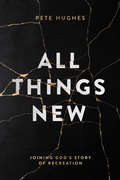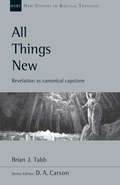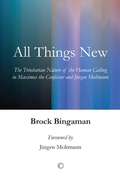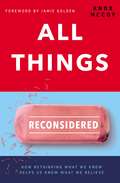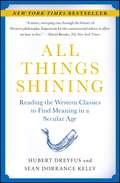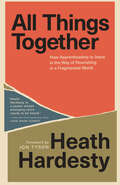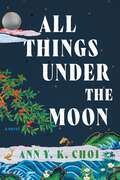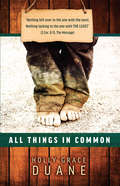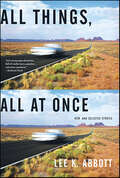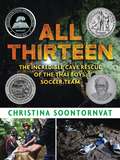- Table View
- List View
All Things New: Joining God's Story of Re-Creation
by Pete HughesGod is on a mission to make all things new: from the fashion industry to the business community, from politics to education and from entertainment to media and the arts. God&’s burning desire is to bring restoration to every sphere of society. Starting in Genesis and working through the Scriptures, All Things New will take you on a journey into the very heart of God and His relentless passion to redeem lives, heal the nations, rewire the culture, and bring renewal to all of creation. As we immerse ourselves in the greatest story ever told we find our ultimate sense of belonging, our purpose in the present and our hope for the future. We become actors in this unfolding drama, pushing forward God&’s purposes for the world and joining His mission to make all things new.
All Things New: Revelation as Canonical Capstone (New Studies in Biblical Theology #Volume 48)
by Brian J. TabbFor many readers of the Bible, the book of Revelation is a riddle that fascinates and frustrates. Scholars and teachers have proposed different keys to its interpretation, including the "futurist" and historical-critical approaches. However, none of these adequately demonstrates the continuing, vital relevance of the Apocalypse to the contemporary church. Brian Tabb stresses the importance of the canonical context of the book of Revelation and argues that it presents itself as the climax of biblical prophecy. He shows how various Old Testament prophecies and patterns find their consummation in the present and future reign of Jesus Christ, who decisively defeats his foes, saves his people, and restores all things. Tabb considers key biblical-theological themes: the triune God; Christ's followers and foes; God's plan for salvation, judgment, and restoration; and God's word. He also explores how the book's symbolic visions shape believers' worldviews in accordance with what is true, good, and beautiful according to God's revealed standards. These visions motivate them to live obediently and counter-culturally in the world as faithful witnesses to Jesus. Addressing key issues in biblical theology, the works comprising New Studies in Biblical Theology are creative attempts to help Christians better understand their Bibles. The NSBT series is edited by D. A. Carson, aiming to simultaneously instruct and to edify, to interact with current scholarship and to point the way ahead.
All Things New: The Trinitarian Nature of the Human Calling in Maximus the Confessor and Jurgen Moltmann
by Brock BingamanFor both Maximus the Confessor (c. 580-662) and Jurgen Moltmann (b. 1926) understanding what it means to be human springs from a contemplative vision of God. This comparative study explores surprising parallels between the theological anthropology of theseventh-century Byzantine monk and the contemporary German Protestant. Bingaman shows that Maximus and Moltmann root their understanding of the human calling in their Trinitarian and christological reflection, in contrast to many modern theologies that tend to devise an account of human being first, and then try to find ways in which Christ and the Trinity are somehow relevant to this human being. In this constructive work, Bingaman demonstrates the intrinsic connection between Maximus and Moltmann's views of human being, Christ and the Trinity, the church, and the human calling in creation. Illustrating the richness of these ancient and postmodern theologies in conversation, 'All Things New' lays out future trajectories in theological anthropology, patristic ressourcement, ecologically attuned theology and spirituality, and Orthodox-Protestant dialogue.
All Things Paper
by Ann MartinAnn Martin has searched the world over for unique and beautiful paper crafts to feature on her popular website--AllThingsPaper.net. In this book, she gathers completely new projects and shows how each is created, step-by-step.All of the paper products in this book are designed by respected paper craft artists, such as Benjamin John Coleman, Patricia Zapata, and Richela Fabian Morgan, who have been making amazing things with paper for many years. Each of the projects, from simple to more complex, has easy-to-follow instructions and detailed photos enabling you to create your own! These colorful and impressive pieces include art objects to display at home as well as items which have practical uses. All of the pieces make a wonderful keepsake or a gift that expresses the beauty, elegance, and versatility of paper.Projects include:Candle LuminariesCitrus Slice CoastersMysterious Stationery BoxEveryday Tote BagSilver Orb PendantFine Paper Yarn NecklaceWedding Cake CardPerfect Journey Journal
All Things Possible: My Story of Faith, Football, and the First Miracle Season
by Kurt Warner Michael SilverNFL sensation Kurt Warner tells the incredible story of faith and perseverance that captured the hearts of millions and rocketed him from obscurity to become MVP and Super Bowl champion.
All Things Possible: Setbacks and Success in Politics and Life
by Andrew M. CuomoIn this frank memoir—a story of duty, family, justice, politics, and resilience—Andrew Cuomo, New York State's fifty-sixth governor, reflects on his rise, fall, and rise again in politics, and the tough (but necessary) lessons he has learned along the way.Born to first-generation American parents in the working-class neighborhood of Queens, New York, Andrew M. Cuomo grew up in a family anchored by a shared belief in community, hard and honest work, and helping others. His father, Mario, led by example, as a tireless advocate for local residents, instilling in his son a passion for public service. From stapling up posters as a sixteen-year-old during his father's first political campaign to managing at twenty-five Mario's successful 1982 bid for New York State governor, Andrew Cuomo witnessed at a young age the power of politics to effect change for the common good. These experiences, reinforced by deeply held personal values, guided him, from novice campaign manager to visionary reform crusader to Clinton cabinet member—at thirty-nine—to groundbreaking governor of his home state. Laying out his unique approach to challenging the status quo, All Things Possible is not a traditional political memoir, but rather one man's revelatory reflection on a life defined by a commitment to public service, and the hard-won truths gleaned from both his struggles and his successes.In recounting his uphill battles to redefine the way America deals with homelessness, rehabilitate the legislative process in Albany, and bring marriage equality to New York, Cuomo presents an inspiring blueprint for greater political cooperation and efficacy. He also unflinchingly examines his failed 2002 gubernatorial bid, which heralded a dark period of political and personal turmoil, to illustrate why failure is inextricably bound up with success, why we should never forget where we come from, and the importance of balancing personal and professional commitments. And he proves, through all that he's achieved since his victory in the 2010 election, that our biggest triumphs lie not in never falling, but in rising every time we fall.With 16-pages of color and black and white photos
All Things Quilting with Alex Anderson: From First Step to Last Stitch
by Alex AndersonThis comprehensive guide by the host of The Quilt Show covers everything you need to know to become a master quilter.Alex Anderson has taught and inspired countless quilters around the world through her television programs, fabric lines, and numerous books. In All Things Quilting with Alex Anderson, she packs her most indispensable knowledge and advice into a single volume. Encyclopedic in its scope, it covers quilting techniques, essential tools, binding basics, piecing and appliqué, and much more. It is both a master class for novices and an essential reference for experienced quilters.
All Things Reconsidered: How Rethinking What We Know Helps Us Know What We Believe
by Knox McCoyIf we ask just one question, does everything fall apart? In All Things Reconsidered, popular podcaster Knox McCoy uses a unique blend of humor, pop culture references, and personal stories to show how a willingness to reconsider ideas can actually help us grow ourselves, our lives, and our beliefs. In this laugh-out-loud defense of reconsideration, Knox dives into topics like:Are participation trophies truly the worst?Is it really worth it to be a ride-or-die sports fan?Do we believe in God because of the promise of heaven—or the threat of hell?Does prayer work? Is anyone even there?This book is the catalyst we need to courageously ask the questions that will lead to a deeper understanding of ourselves—and God. It&’s time to start reconsidering.
All Things Reconsidered: My Birding Adventures
by Roger Tory PetersonRoger Tory Peterson’s unique perspective on birding comes to life in these highly personal narratives. Here he relates his adventures during a lifetime of birding and traveling the world to observe and record nature. Though Peterson was widely known for his illustrations, this collection reminds us to reconsider his accomplishments as a photographer, for Peterson was nearly as passionate about photography as he was about painting. The essays and photographs included here were carefully selected by Bill Thompson III, the editor of Bird Watcher’s Digest, which ran the column “All Things Reconsidered” during the last twelve years of Peterson’s life.
All Things Shining: Reading the Western Classics to Find Meaning in a Secular Age
by Hubert Dreyfus Sean Dorrance KellyIn unrelenting flow of choices confronts us at nearly every moment of our lives, and yet our culture offers us no clear way to choose. This predicament seems inevitable, but in fact it's quite new. In medieval Europe, God's calling was a grounding force. In ancient Greece, a whole pantheon of shining gods stood ready to draw an appropriate action out of you. Like an athlete in "the zone," you were called to a harmonious attunement with the world, so absorbed in it that you couldn't make a "wrong" choice. If our culture no longer takes for granted a belief in God, can we nevertheless get in touch with the Homeric moods of wonder and gratitude, and be guided by the meanings they reveal? All Things Shining says we can.Hubert Dreyfus and Sean Dorrance Kelly illuminate some of the greatest works of the West to reveal how we have lost our passionate engagement with and responsiveness to the world. Their journey takes us from the wonder and openness of Homer's polytheism to the monotheism of Dante; from the autonomy of Kant to the multiple worlds of Melville; and, finally, to the spiritual difficulties evoked by modern authors such as David Foster Wallace and Elizabeth Gilbert.Dreyfus, a philosopher at the University of California, Berkeley, for forty years, is an original thinker who finds in the classic texts of our culture a new relevance for people's everyday lives. His lively, thought-provoking lectures have earned him a podcast audience that often reaches the iTunesU Top 40. Kelly, chair of the philosophy department at Harvard University, is an eloquent new voice whose sensitivity to the sadness of the culture--and to what remains of the wonder and gratitude that could chase it away--captures a generation adrift.Re-envisioning modern spiritual life through their examination of literature, philosophy, and religious testimony, Dreyfus and Kelly unearth ancient sources of meaning, and teach us how to rediscover the sacred, shining things that surround us every day. This book will change the way we understand our culture, our history, our sacred practices, and ourselves. It offers a new--and very old--way to celebrate and be grateful for our existence in the modern world.
All Things Together: Christian Romantic Suspense (Acts of Valor #6)
by Rebecca HarttDiscover a Tale of Faith, Courage, and Redemption in “All Things Together,” a Christian Romantic Suspense from Rebecca Hartt—Present Day, Virginia Beach, Virginia and Savannah, Georgia—In this last installment of the Acts of Valor Series, Emma Stuart’s world is turned upside down when her three beloved sons are abducted right before her eyes. With the police more focused on framing Emma than on finding her boys, she turns to the one man she’s been trying to resist—her landlord.Navy SEAL sniper, Ben Harmony considers himself “Mr. Fix-it” for a reason. Loath to let his favorite tenant and single mother suffer any more than she already has, Ben decides they should track down Emma’s boys themselves. While they’re at it, Ben will prove to Emma that her heart is safe with him, despite his reputation as a lady’s man.In their quest to track down Emma’s ex, the couple encounters a secret society so powerful, not even a Navy SEAL can bring it down. Indeed, it’s the society that seeks to bring Ben down. With Mr. Fix-it possibly dead and her boys still missing, Emma has to wonder: How, exactly, is God working all things together for her good?Publisher’s Note: With her masterful storytelling, Rebecca Hartt plunges into the depths of emotion, taking readers on a rollercoaster ride of suspense, hope, and ultimate triumph. Fans of Ronie Kendig, Lynnette Eason, Dee Henderson, as well as Marliss Melton, Susan May Warren, and Colleen Coble, will enjoy this enduring power of faith, the resilience of the human spirit, and the redemptive nature of love. The Acts of Valor SeriesReturning to EdenEvery Secret ThingCry in the WildernessRising From AshesBraving the ValleyAll Things TogetherRebecca Hartt is the nom de plume for an award-winning, best-selling author of a different name who, compelled by her faith, decided to spin suspenseful military romance where God plays a vital role in character motivation and plot.As a child, Rebecca lived in countries all over the world. She has been a military dependent for most of her life and knows first-hand the dedication and sacrifice required by those who serve.Living near the military community of Virginia Beach, Rebecca is constantly reminded of the peril and uncertainty faced by U.S. Navy SEALs, many of whom testify to a personal and profound connection with their Creator.Their loved ones, too, rely on God for strength and comfort. These men of courage and women of faith are the subjects of Rebecca Hartt’s enthusiastically received Acts of Valor romantic suspense series.
All Things Together: How Apprenticeship to Jesus Is the Way of Flourishing in a Fragmented World
by Heath HardestyFeeling fragmented and longing for wholeness? Pastor Heath Hardesty reveals how apprenticeship to Jesus can reintegrate your life, offering a fresh vision for spiritual formation that leads to true human flourishing.&“Heath Hardesty is a pastor whose emerging voice needs to be heard.&”—John Mark Comer, New York Times bestselling author of Practicing the Way and The Ruthless Elimination of HurryIn a world of burnout, shattered attention, digital overwhelm, and spiritual disconnection, many have lost sight of the greater story they were meant to inhabit.All Things Together is a winsome invitation to rediscover that story through a re-imagined vision of apprenticeship to Jesus—one that brings coherence to the scattered pieces of our lives and cultivates peace in a divided world.Rooted in a deeply biblical three-part paradigm, Pastor Heath Hardesty shows how in apprenticeship, union with Jesus is the origin, abiding and obeying Him are the essence, and imaging Him is the aim. Weaving scriptural wisdom, pastoral insight, and blue-collar experience, he gently guides readers into vital practices for a reintegrated life and a renewed sense of what it means to be truly human.Whether you&’re a seeker, a seasoned follower of Jesus, or simply longing for something more whole and alive, All Things Together will ignite your imagination and equip you to draw closer to God as He transforms you into a person of greater love, lasting joy, and radiant wholeness.
All Things Under the Moon: A Novel
by Ann Y. ChoiPachinko meets Beasts of a Little Land in this stunning, evocative tale, set in 1920s Korea, of one seemingly ordinary woman—an uneducated villager living under Japanese occupation—who takes control of her own destiny and rises to become an advocate for women&’s literacy as a force for change.&“Women need other women to survive.&” In 1924, Korea is an occupied country. In Seoul&’s secret, underground networks and throughout the countryside, rebellion against the Japanese Empire simmers, threatening to boil over. Kim Na-Young lives a simple life in the rural village of Daegeori, where she watches the moon rise and set over the pine-wooded mountains, tends to her household alongside her best friend, Yeon-Soo, and cares for her sick mother. But the occupation touches every Korean life—even Na-Young&’s. In the wake of a tragedy that stuns the village, Na-Young&’s father arranges her marriage to a man she&’s never met, and Na-Young and Yeon-Soo decide to flee, taking their fate into their own hands. That decision sets them on their own collision course with the occupying forces, resulting in a violent encounter that will alter both of their lives forever—in shockingly different ways. Taking us from a small village to the bustling corridors of Seoul, where women and girls can learn to read and write in multiple languages and members of the revolution pass coded messages through the back rooms of teahouses, Ann Y. K. Choi weaves a masterful tale of a woman taking command not only of her own identity but her own destiny. A sweeping journey through historical Korea and an utterly compelling portrait of one woman&’s remarkable life, All Things Under the Moon is both a stunning literary achievement and a beautifully written tribute to the sacrifices women make for each other.
All Things Wicked (Dark Mission #3)
by Karina CooperJuliet Carpenter thought of the coven as family, but when she falls for a man who betrays them all, she's left alone and desperately searching for a reason why. Caleb Leigh has spent the past year in hiding, unable to escape his demons. When Juliet finds him again, her need for vengeance clashes with the hunger still burning between them. It's a fight born from the embers of a half-forgotten attraction and the wounds of a past too raw to ignore. With enemies circling and secrets threatening to consume them, Caleb has no choice but to fulfill a promise made long ago-protect her, save her. Even if it costs him his blood, his body . . . and what's left of his mind.
All Things Wise and Wonderful: The Warm And Joyful Memoirs Of The World's Most Beloved Animal Doctor (All Creatures Great and Small #3)
by James HerriotWorld War II intrudes on the pastoral life of the Yorkshire veterinarian and #1 New York Times–bestselling author of All Creatures Great and Small. Only a couple of years after settling into his new home in northern England, James Herriot is called to war. In this series of poignant and humorous episodes, the great veterinarian shares his experiences training with the Royal Air Force, pining for a pregnant wife, and checking in on the people back home who made his practice so fascinating. As the young men of Yorkshire are sent into battle and farmers consider the broader world they&’re a part of, Herriot reflects on the lives—human and animal alike—that make his home worth fighting for.
All Things at Once
by Mika BrzezinskiAs the co-host of MSNBC’s popular morning showMorningJoe, Mika Brzezinski has established herself a leading political news journalist and beloved television personality. She daily interviews world leaders—Barack Obama, Hillary Clinton, John McCain—and discusses the major events of the day with guests like Tom Brokaw, Dan Rather, Andrea Mitchell, Chris Matthews, Maureen Dowd, and Tom Friedman. But success hasn’t always come easy for Mika. Growing up the only daughter of a former National Security Advisor, she struggled to find an identity in a family of over-achievers. She found her dream job early on and was hailed as the “It Girl” of CBS, only to be fired just a few short years later. After an unsuccessful stint as a stay-at-home mom, Mika went back to the workplace with encouragement from her 8-year-old daughter. She took a job that seemed a long-shot at best, and against all odds achieved the greatest success of her career. Now, in a time when many women are losing their jobs or struggling to find the perfect balance between work and home, Mika guides women of all ages to a place where they can find peace and fulfillment in their lives. All Things at Onceis a motivational book aimed at women, based on Mika’s own personal and professional triumphs and failures—all of which have led her to her current position as one of television’s most outspoken and respected journalists. Blending the personal with the prescriptive, Brzezinski’s book will address the perpetual question of “having it all” when it comes to work and family; the importance of remaining equally humble in the face of great success and seemingly devastating setbacks; as well as the necessity of knowing and embracing our limitations so that we may transcend them. In the tradition of Gail Sheehy’s classicPassages, this illuminating book shows women how to reach their full potential in all areas of life, and at every stage of their journey. Readers will recognize their friends, their mothers, their daughters, and themselves in this refreshingly honest memoir.
All Things in Common
by Holly Grace DuaneWhen Holly Duane was growing up in New Zealand, being poor was a way of life for her Christian family. As a young adult she wondered why believers with the financial means to aid impoverished Christians would choose not to. After undertaking a study of the more than two thousand Bible verses about helping the poor, she seeks today to teach Christians in prosperous nations how to share their lives and resources with the needy. In All Things in Common, Holly calls for the body of Christ to embrace God’s heart for the poor and explains why the Bible links giving to the poor with revival. She unpacks what it means to assist the poor while offering practical ways to do this in a biblical manner.
All Things in Common: A Canadian Family and Its Island Utopia (Canadian Social History Series)
by Ruth BrouwerIn the first decade of the twentieth century, a few closely related families established a utopian community in Canada’s smallest province. Known officially as B. Compton Limited but described by a journalist in 1935 as "Prince Edward Island’s unique ‘brotherly love’ community," this utopia owed its longevity to the cohesion provided by its communal organization, dense kin ties, and long-held millenarianism – and to a decidedly pragmatic approach to business. All Things in Common demonstrates how "un-utopian" such a community could be while problematizing the contention that the inevitable end of all utopian experiments is a full-blown dystopia. Beginning with a compelling backstory and locating the Compton community in the historiography of North American utopias, the author goes on to explore the community’s business endeavours, its religious, familial, and transgressive aspects, and its brief period of international fame before assessing the factors that led to its dissolution in 1947. Providing a strong narrative framework, All Things in Common draws on rich family and archival records and diverse secondary sources, concluding with a consideration of the community’s legacy for its alumni and their descendants.
All Things in Their Place
by Giulia Dell'Uomo Caroline PetricolaSara has just turned 20 when she discovers she has cancer. The illness, although turning her life upside down, becomes the moment when she decides to live life to the full- she wants to keep making plans, fight and love. She wants to live so much that her relationship with her doctor, Roberto, grows outside the hospital walls and encroaches on real life, where love and fear intertwine in a web of instense emotion. Her time is marked by stints in hospital, endless exams, tears, laughter, the knowledge that her illness won't go away and the rebirth of a girl forced to become a woman too early.
All Things to All People: A Catholic Church for the Twenty-First Century
by Louis DethomasisThe word but was used by Jesus often to clarify to his disciples his teaching was different from the conventional wisdom of the time: "But I say to you..." This was never more true when he was speaking about how the disciples (right up to today) were to act toward one another and toward those outside the group. Louis DeThomasis, a well-respected De La Salle Christian Brother and President Emeritus of St. Mary's University of Minnesota, uses this method of Jesus to look at the Catholic Church today and how it must change if it is to carry out the mission it has been given by its founder. "Even if at times the observations of this book may seem quite critical (or certainly at least impolitical or undiplomatic, given the clashes and tensions in the church today)," he insists, "I think it's about time that the People of God find the courage to speak out to all Jesus' followers and to all people of good faith, and to speak up to all institutional church leaders forcefully, although always with Christian love. Love for the church does not preclude criticism of or about the church. If we become 'one' in the church (as we pray every day in the Creed), it seems to me indisputable- whether we are conservative, moderate, or progressive by nature- that we desperately need to increase our knowledge and understanding of the gospel, the good news of Jesus Christ, in a caring, supportive, and loving Christian Spirit." Buckle up for an old-fashioned but good-spirited Catholic brawl about the future of the Catholic Church in the twenty-first century. You may not agree with every one of Brother Louis' arguments, but they will cause you to think about what kind of Church we need and want...or, better yet, what kind of church Jesus wants us to be.
All Things, All at Once: New and Selected Stories
by Lee K. AbbottThe long-awaited new collection from Lee K. Abbott, "Cheever's true heir, our major American short story writer" (William Harrison).Here are stories about fathers and sons, stories about men and women, and stories about the relationships between men by one of our most gifted story writers. The narrator of "The Who, the What and the Why," begins breaking into his own house as a sort of therapy after his daughter dies. In "The Human Use of Inhuman Beings," the main character realizes that his closest relationship is to an angel, who appears to him only to announce the death of loved ones. All Things, All at Once reminds us why Lee K. Abbott is to be treasured: his perfect pitch for tales of hapless Southwesterners, his way with sympathetic irony, his eye that skillfully notes the awkward humiliations—common heartbreak, fractured families—and records it all in lyrical, affectionate language. In tales new and from previous collections Abbott examines lived life and the lies we necessarily tell about it.
All Thirteen: The Incredible Cave Rescue of the Thai Boys' Soccer Team
by Christina SoontornvatOn June 23, 2018, twelve young players of the Wild Boars soccer team and their coach enter a cave in northern Thailand seeking an afternoon’s adventure. But when they turn to leave, rising floodwaters block their path out. The boys are trapped! Before long, news of the missing team spreads, launching a seventeen-day rescue operation involving thousands of rescuers from around the globe. As the world sits vigil, people begin to wonder: how long can a group of ordinary kids survive in complete darkness, with no food or clean water? <P><P>Luckily, the Wild Boars are a very extraordinary "ordinary" group. Combining firsthand interviews of rescue workers with in-depth science and details of the region's culture and religion, author Christina Soontornvat—who was visiting family in Northern Thailand when the Wild Boars went missing—masterfully shows how both the complex engineering operation above ground and the mental struggles of the thirteen young people below proved critical in the life-or-death mission. Meticulously researched and generously illustrated with photographs, this page-turner includes an author’s note describing her experience meeting the team, detailed source notes, and a bibliography to fully immerse readers in the most ambitious cave rescue in history.
All This Belongs to Me
by Ad HudlerAn often hilarious, always moving novel that explores love and fate and the ways we lie to ourselves to get by in a sometimes overwhelming world. When a mishap in the mail brings Geena into Ellis's life, neither realizes how much they need each other. With her marriage in tatters, Geena is still recovering from the sudden loss of her son. Ellis has been alone in the world since the death of his mother, and as he approaches his twilight years, the routine of everyday life has replaced the relationships he might once have known. When that routine is thrown into disarray by changes at the Thomas Edison estate, where Ellis works as a tour guide, he is lost until Geena brings courage and independence back into his life. For Geena, caring for Ellis is the salve on her own wounds. In a fascinating tale of fate and second chances, Ad Hudler weaves an intricate web showing the importance of friendship, family, and the need to accept one another, flaws and all. From the Trade Paperback edition.
All This Belongs to Me: A Novel
by Ad HudlerAn often hilarious, always moving novel that explores love and fate and the ways we lie to ourselves to get by in a sometimes overwhelming world.When a mishap in the mail brings Geena into Ellis's life, neither realizes how much they need each other. With her marriage in tatters, Geena is still recovering from the sudden loss of her son. Ellis has been alone in the world since the death of his mother, and as he approaches his twilight years, the routine of everyday life has replaced the relationships he might once have known. When that routine is thrown into disarray by changes at the Thomas Edison estate, where Ellis works as a tour guide, he is lost until Geena brings courage and independence back into his life. For Geena, caring for Ellis is the salve on her own wounds. In a fascinating tale of fate and second chances, Ad Hudler weaves an intricate web showing the importance of friendship, family, and the need to accept one another, flaws and all.From the Trade Paperback edition.
